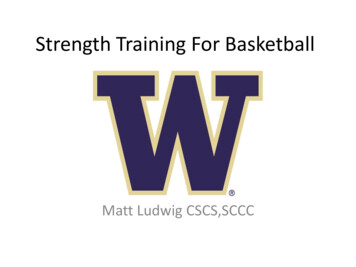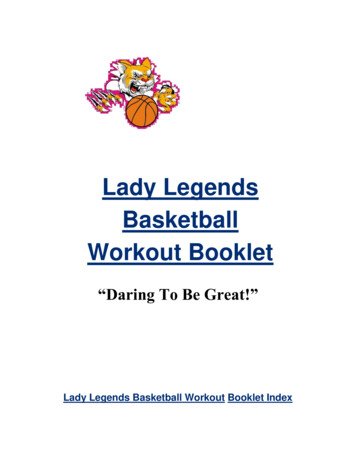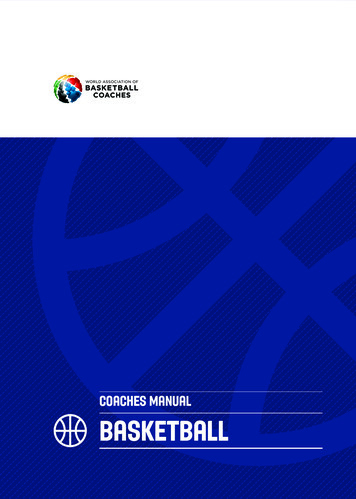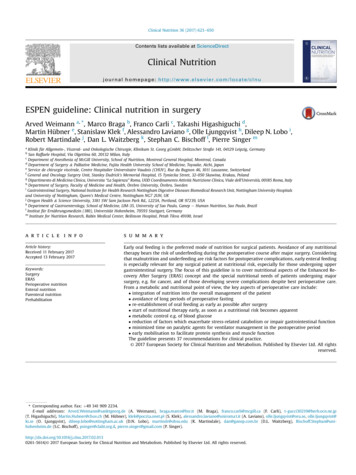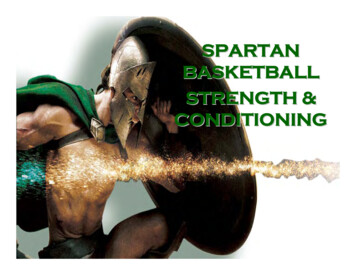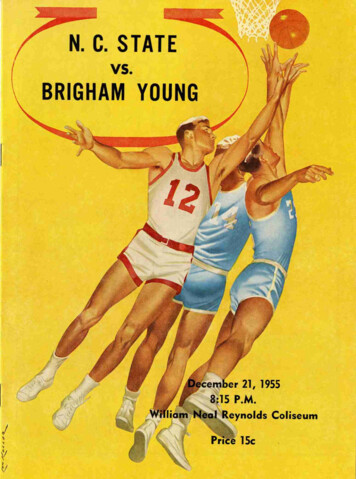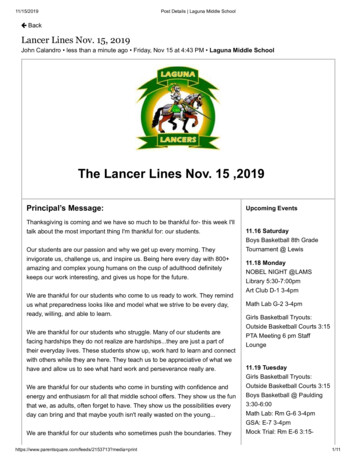
Transcription
Basic Nutrition Guidefor Basketball PlayersPLEASE SAVE THIS FILE TO YOUR COMPUTERNo part of this document may be reproduced, stored in a retrieval system, or transmitted in anyform or by any means, electronic, mechanical, photocopying, recording, or otherwise, withoutthe prior written permission from the author.The exercise information presented on these pages is intended as an educational resourceand is not intended as a substitute for proper medical advice. Consult your physician or healthcare professional before performing any of the exercises described on these pages or anyexercise technique or regimen, particularly if you have chronic or recurring medical conditions.Discontinue any exercise that causes you pain or severe discomfort and consult a medicalexpert. Neither the author nor advertisers of this manual make any warranty of any kind inregard to the content of the information presented and accept no responsibility for its misuse.For additional basketball-specific strength &conditioning resources, visit:StrongerTeam.comThe #1 Authority on Improving Basketball nSteinFacebook.com/StrongerTeamA note from AlanThank you for your purchase, I truly appreciate yourbusiness. I personally guarantee to deliver high qualitytraining resources and unparalleled customer service. 2013 Stronger Team, LLC All Rights Reserved
Stronger Team, LLCBASIC NUTRITION GUIDE FOR BASKETBALL PLAYERSIn order to truly achieve your potential on the court, it is imperative you develop healthy eating habits. Thefollowing information serves as a very basic nutritional guide for putting you on the right path. For an in depthlook at your eating habits you should contact a Registered Dietician (RD) or sports nutritionist. It is important tounderstand there are no evil foods; any food can be incorporated into your diet in moderation. However, tomaximize your performance you should try and drastically reduce your intake of refined sugars (cookies,candy, etc.) and saturated fat (butter, fried foods, etc.) and eat plenty of fruits, vegetables, and whole grains.Optimum basketball performance requires sound nutritional habits. You can get your daily requirements ofnutrients through whole food, so don’t rely too heavily on the use of supplements (the addition of a "weightgain" or protein shake supplement can be helpful for those trying to increase bodyweight and have difficultlyeating sufficient calories). Please steer clear of all "performance" enhancing supplements; such as Creatine orephedrine. Let me repeat, we do not endorse nor advocate any performance enhancing supplements. Makesure you know exactly what you put into your body! Don’t ever take any pill or powder unless you knowspecifically what it is.Most basketball players are tall and slender, and are looking to add muscular bodyweight. In order to gainweight, a player must consume more calories than they expend on a daily basis. This means players lookingto put on weight must eat, eat, and eat. Now for the select few looking to lose weight (i.e. reduce body fat),they must do the opposite – consume fewer calories than they expend. This is done by controlling portionsizes.To determine how many calories per day you should consume, multiply your current bodyweight by 25. Thiswill give you a very rough estimate of your daily caloric needs. For example, a 150 lb. basketball player tryingto gain muscular body weight requires around 3750 calories a day (150 X 25 3750). Depending on individualmetabolism, as well as daily energy expenditure through physical activity, this number may have to be slightlyadjusted. Remember, this is just an estimate!It is very important not to overlook the role nutrition plays in acquiring maximum physical development. Whatyou eat on a daily basis helps determine your body fat levels as well as how much energy you have forintense, rigorous workouts, practices and games. Whether you are trying to gain muscle, reduce body fat, ormaintain your current stature - it is very important you follow these basic dietary recommendations: A balanced diet consists of roughly 55-60% carbohydrates, 15-20% fat, and 20-25% proteinEat a variety of healthy foods (fruits, vegetables, whole grains, etc.)Limit your intake of fat, sugar, and sodiumDrink plenty of water!Eat 3 standard meals plus 3 snacks (mid morning, post workout, before bed)Quality Food ChoicesProtein: fish, chicken, tuna, lean red meat, turkey, low fat dairy productsCarbohydrates: oatmeal, brown rice, whole wheat pasta, sweet potatoes, beans, fruits, veggiesFat: fish, nuts, peanut butter 2013 Stronger Team All Rights Reserved1
Stronger Team, LLCBASIC NUTRITION GUIDE FOR BASKETBALL PLAYERSSample Daily MenuBreakfast:3 eggs 5 egg whites, raisin bagel with 2 tbsp. of low fat cream cheese620 calories – 48g protein – 55g carbohydrates – 22g fatSnack:16 oz. fat free milk, 1 scoop protein powder, 2 cups of strawberries (blended)400 calories – 42g protein – 54g carbohydrates – 3g fatLunch:Subway 6 inch Oven Roasted Chicken Breast Sandwich, Subway Broccoli/Cheese soup510 calories – 29g protein – 63g carbohydrates – 16g fatSnack: (post workout)2 peanut butter and jelly sandwiches on whole wheat bread, 12 oz. chocolate milk800 calories – 35g protein – 65g carbohydrates – 35g fatDinner:6 oz. ground turkey, 4 oz. cooked pasta, ¾ cup pasta sauce625 calories – 58g protein – 92g carbohydrates – 4g fatSnack:4 oz. deli style turkey, 2 slices of whole wheat bread, 2 tbsp. of fat-free mayonnaise, banana385 calories – 26g protein – 63g carbohydrates – 6g fatTotals: 3,340 calories – 238g protein – 392g carbohydrates – 86g fatFluid GoalsIt is extremely important to be well hydrated, especially during intense workouts. Your performance on thecourt can decrease dramatically when your body is low on water. You should aim to drink water all day long;don't wait until you are thirsty.1.2.3.4.Drink 16 oz. of fluid 2 hours before a workout, practice, or gameDrink 8 oz. 15 minutes prior to a workout, practice, or gameDrink during the workout, practice, or gameDrink 24 oz. per pound of bodyweight lost after the game. 2013 Stronger Team All Rights Reserved2
Stronger Team, LLCBASIC NUTRITION GUIDE FOR BASKETBALL PLAYERSAdditional Tips Consume enough calories to add 1lb. of bodyweight per week. If you aren’t gaining weight with whatyou are currently eating eat more! Try and get most of your calories from real food; don't rely on too many supplements Adopt healthy eating habits to last you a lifetime. Don't bother with a quick fix or a temporary diet. If youare on a diet temporarily, you will lose the results once you stop. Plan your day. Pack snacks and wake up early enough to eat breakfast. Eat a diet rich in complex carbohydrates to provide the energy source to fuel your intense training,practices, and games.Pre-Game RulesEat lightly before you play. You don’t want a full stomach to weigh you down.Limit eating fatty foods before you playDrink sufficient amounts of water (see above for fluid requirements)Aim to eat 2-4 hours before you play; this gives you body plenty of time to digest. The closer it gets togame time, the smaller the meal.5. Make sure the meal includes good carbohydrate choices (for energy) but also has adequate protein (tohelp ward off hunger).1.2.3.4.Halftime Rules1. Replenish fluids with water and/or a small amount of a sports beverage2. Eat something very small for quick energy; gummy bears are a perfect!Post-Game Rules1. Consume carbohydrate rich foods and beverages as soon as possible after you play. This will replenishyour muscle’s energy stores.2. Replace fluids that have been lost (see above for fluid requirements).3. Replace any potassium or sodium that has been lost during competition or training. Fruits, vegetables,and salty foods are excellent for this. 2013 Stronger Team All Rights Reserved3
Stronger Team, LLCBASIC NUTRITION GUIDE FOR BASKETBALL PLAYERS10 Golden Nutrition Rules for Basketball Players1.2.3.4.5.6.7.8.Eat something every 2-3 hours, regardless of hunger levels.Get lean protein at every meal.Eat healthy fats every day. Avoid all hydrogenated (Trans) fats and fried foods.Breakfast and pre/post-workout (or game) meals are the 3 most important meals.Eat lean protein before you go to bed each night.Eat vegetables as often as possible.Drink water all the time. Don’t drink anything with high fructose corn syrup.Try to eat these foods at least 3 times per week: lean red meat, berries, fish, oranges, eggs, beans,whole oats, spinach, nuts, sweet potatoes, avocadoes, tomatoes, and broccoli.9. Use supplements intelligently; not as a crutch or to make up for poor diet. Avoid all performanceenhancing supplements; only use for extra protein or calories.10. Serious players are serious about nutrition. Eat like crap, play like crap!Post-Workout CaloriesShakes are an easy and quick way to get great calories after a workout!Recipe for Shake #1: 1 cup of frozen fruit (strawberries and/or blueberries work well)1 cup of either low fat milk or orange/apple juice1 cup of low fat yogurt1 packet of low sugar oatmeal1 to 2 scoops of protein powderBlend and enjoy!Recipe for Shake #2: 1 frozen banana1 cup of low fat milk1 teaspoon of honey1 teaspoon of chocolate syrup1 big scoop of peanut butter1 to 2 scoops of protein powderBlend and enjoy!This Nutrition Guide for Basketball Players has been compiled from the information found in numerous articlesand presentations by competent, qualified sports nutritionists over the past several years. Please keep in mind,these guidelines are just that, general recommendations. For specific information on what to eat, when to eat it,and regarding your individualized needs, please speak with a Registered Dietician (RD). 2013 Stronger Team All Rights Reserved4
Basic Nutrition Guide for Basketball Players PLEASE SAVE THIS FILE TO YOUR COMPUTER No part of this document may be reproduced, stored in a retrieval system, or transmitted in any form or by any means, electronic, mechanical, photocopying, recording, or otherwi
